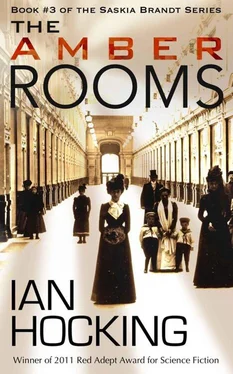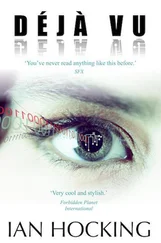‘A useful technology,’ she said, ‘but crude in comparison to i-Core.’
‘What is i-Core?’
‘A nanotechnology that infests my blood. It repairs me and works for my benefit—or perhaps its own. At the moment, these benefits amount to the same thing.’
‘I am not aware of any technology by that name.’
‘Were these glasses provided by the Foderative Investigationsburo? In this universe, do I still work for them?’
Again, Ego said nothing.
‘Ego,’ she said, ‘given my behaviour and the quantum event, don’t you agree that there is a chance I’m telling the truth?’
‘Every possibility has an associated probability.’
‘Ego, please. Let’s start with the date. My glasses tell me it is January, 1970. I don’t believe that.’
‘In all likelihood, the quantum event has reset their fastware. The same thing almost happened to me.’ Ego paused for the length of a human sigh, but no sound came from the little card. ‘Look for the constellation Cepheus. Face north. Look directly up and a little to the east. Do you see it?’
‘What am I looking for?’
‘Within Cepheus, we find the Mu Cephei, a runaway star with a peculiar velocity of approximately eighty kilometres per second. Your lenses can use the relative position of this star against its neighbours to calculate the date.’
The portion of sky acquired a yellow rectangle. It throbbed once, turned green, and the superimposed date changed to 23rd May, 1908. Exactly the same date as the masked ball.
‘It worked. Thank you.’
‘My Saskia,’ said Ego, ‘let’s call her Saskia Beta, never thanked me.’
‘Ego, meet Saskia Alpha. Thanks.’
She blinked hard. The heads-up display faded to a ghost, then was gone. She took a long breath and raised her scarf until it covered the bridge of her nose. Tying it behind her head, she touched a tender spot, where there was a swelling. She was frustrated by the absence of any memory for this life, this body, but she had two hands. She felt doubly powerful. No longer did she need clever combinations of her teeth and right hand to conduct the basics of her life: dressing, eating. She remembered an incident two years before, when she had wept at the close of a theatre play. Kamo had been with her. He asked why such a jolly production should leave her in tears. The truth was that, while she anticipated and steeled herself against those moments when the absence of her hand would sting her, she had not concerned herself with the habit of applause. She could not clap. Ever again.
Saskia looked at her hands. She gathered her skirt at the knees and wound its edge into a knot. She tucked her glasses into her bosom. This dash—to fit within the circuit of the guard at the north-east entrance—would be a useful test of the fitness of this body.
She took a breath, held it, took another, and sprinted across the facade of the Great Palace. She relaxed as her legs extended and her arms swung. This body was fit. She was faster with two hands. Perhaps it was the balancing effect. Her stride length increased and she flew on her toes until her speed was ten metres per second. Whatever this version of Saskia had done so far in life, she had maintained her fitness. Window after window of the palace telescoped by. Fast enough. She slowed as she reached the chapel and looked for the guard, who was pacing less than fifty metres away. She focused on him. She broke down to a jog. Her long strides fell on the gravel in perfect synchrony with his. At the outer wall, the hoof-falls and wheel scrapes of the road covered her movements, and as the guard turned the corner, she skipped into shadow.
The magnificent outer gate was locked.
She looked at the wall. There were thin grooves in the cladding and a chimney gap between the chapel and the outer wall. She took a breath and dropped her shoulders and dashed into the gap. Her right foot kicked against the outer wall and she surged upward. She twisted, scuffed against the chapel wall, twisted again, and gripped the ledge of the outer wall. She paused to check the progress of the guard. He had not heard her.
She tumbled over the wall and landed on all fours next to a fine horse. After brushing the grit from her palms, she checked that Ego and the glasses were still in place. Pasha was holding the horse. He looked at her with a sour expression.
‘It’s been a while since I saw your acrobatics. You could teach my men a thing or two.’
‘Did you telephone ahead?’
‘Yes. There was no answer.’
‘Do you trust me?’
He slid a travelling cloak from the horse.
‘Put this on,’ he said, shaking it. ‘Quickly.’
Saskia allowed him to put the cloak across her shoulders. It was heavy, black velvet with a hood. She inclined her head and put her hand over his. ‘Then you trust me.’
‘I do not, Ms Tucholsky.’
~
Saskia sat opposite Pasha in their train compartment as they entered St Petersburg. She was counting her radial pulse. For the duration of the journey, it had not peaked above forty-five beats per minute. That satisfied her. She used the steady wash of blood to discipline her thoughts. Her mind turned to the day when she had taken Pasha— that is , she thought, Pasha Alpha —to the Tsar’s Village. Her escape through the Amber Room had seemed so trivial in prospect that she had considered it done. How horrifying that Kamo had appeared to ruin the day. She remembered the fight, the pain, and the dash from the Summer Palace. How much of this overlapped with the reality where Pasha Beta had become a Hussar? She needed to find out. But Pasha had been as reluctant as Ego to answer her questions, and now that the train was drawing close to St Petersburg, she feared that the pace of events would accelerate beyond her capacity to react rationally. She made an explicit promise to herself that she should exploit this opportunity. Her voyaging mind had taken her to a reality whose future was perhaps undetermined. She would do here what she could not do in her own reality: undo the work of Soso. She must stop him from becoming the man to conduct monologues over Russian sorrows. Her years-long goal—that of a return to the future, to 2023—would come second to this.
She tried to inventory her disadvantages: no i-Core, which meant her wounds could not heal quickly. The future of this reality might not require her actions as an older woman. She could not, therefore, count on the protection of a paradox.
She had one advantage. It swept all disadvantages before it.
She could choose.
In the compartment, rocking, electrically lit, Saskia watched Pasha. He still wore his bearskin. He was not permitted to alter his uniform in public. She said, ‘Your father will tell us where the thieves have taken the money.’
‘They can have it,’ said Pasha, spitting out the words as though the silence had been working on him. ‘I’m helping you only because of Father.’
‘You want me there to draw him out,’ Saskia mused. ‘So you can see for yourself whether he is involved in seditionist activities.’
‘I recall your medical expertise, too,’ Pasha replied. ‘You told us that you studied medicine in Zurich. Or was that a lie?’
Saskia sighed. She shaded her eyes from the bulb, which buzzed in its shade.
‘This is a great risk for you, Pavel Eduardovitch.’
‘It is not,’ he said, with an artificial smile. ‘I am an Imperial officer in pursuit of suspects. I have arrested number three in the hope of finding numbers one and two.’
‘And yet you have left your post and told no-one.’
‘That will hardly worry my superior, to whose daughter I am betrothed.’
Saskia grunted. She looked at her left hand. She put it through closing, opening, furling.
Читать дальше












